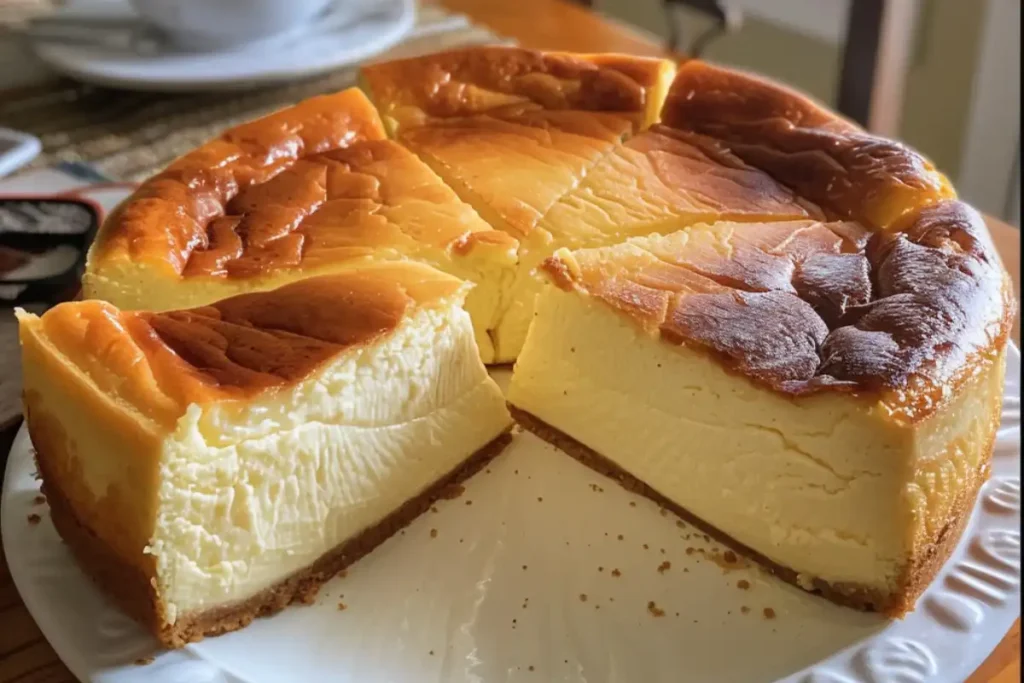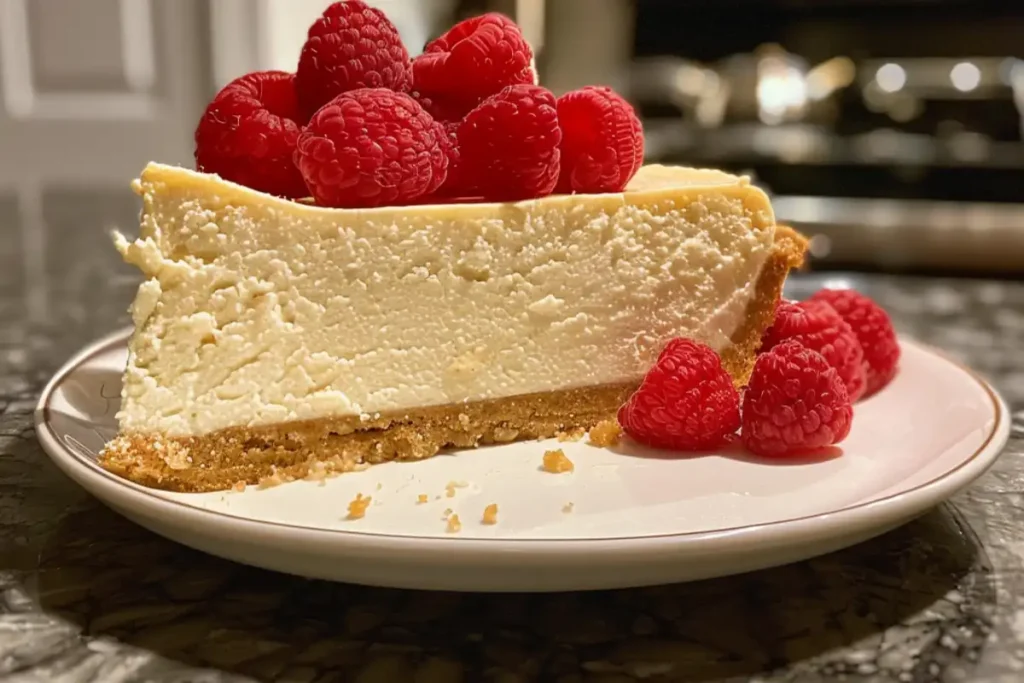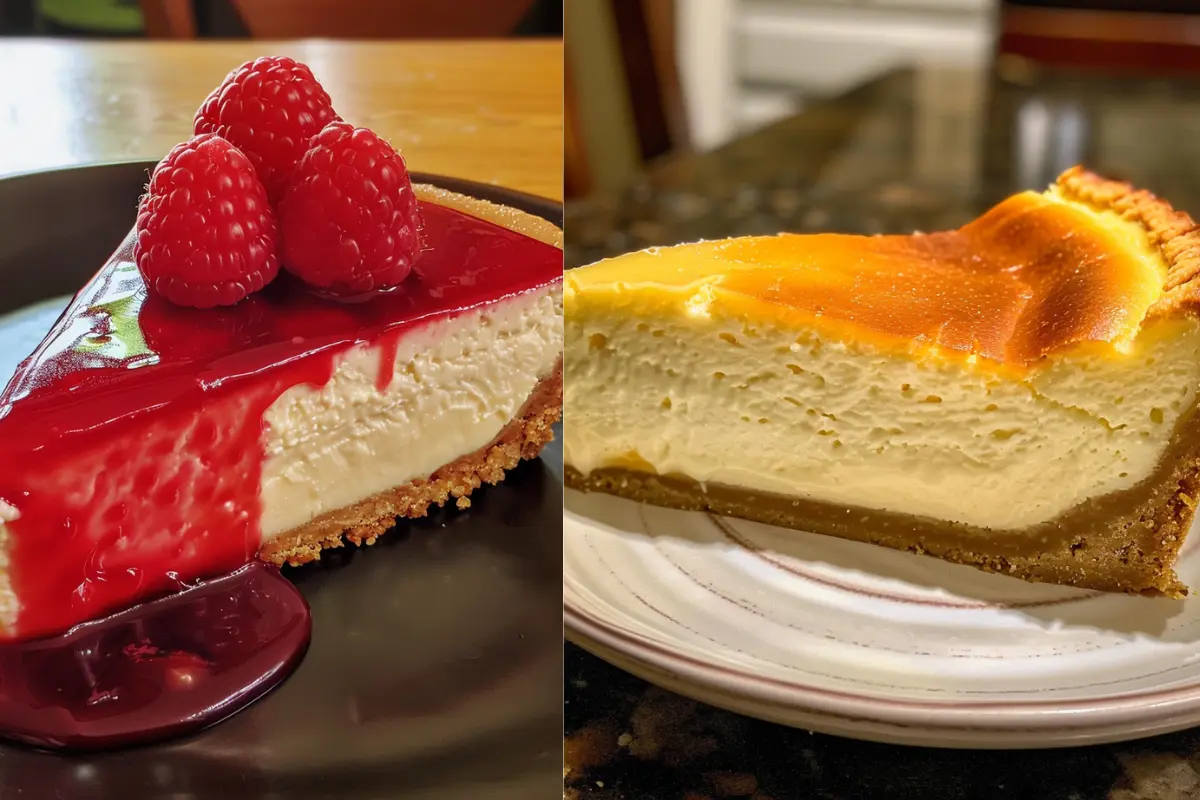When it comes to finding the best cheesecake, the debate often centers around two popular types: baked vs. no-bake. Each has its unique qualities, with baked cheesecakes known for their rich, dense texture and deep flavor, while no-bake cheesecakes offer a lighter, airier consistency that many find refreshing. Whether you’re a fan of the traditional, oven-baked approach or you prefer the simplicity of a no-bake recipe, the question remains: which one truly stands out as the best? In this article, we’ll dive into the differences between these two beloved cheesecake styles, comparing their taste, texture, and ease of preparation to help you decide which one deserves the title of best cheesecake: baked vs. no-bake.
What Makes the Best Cheesecake: Baked vs. No-Bake?
What is Baked Cheesecake?
Baked cheesecake is the traditional form of this dessert, well-known to many. A mixture of cream cheese, eggs, sugar, and other flavorings creates this cake, which is then baked to set. The baking process plays a crucial role in developing the cake’s texture and flavor.
- Key Ingredients: Baked cheesecakes typically contain cream cheese, eggs, and sugar, with some recipes including sour cream or heavy cream. Eggs bind the ingredients and provide structure.
- Texture and Flavor: Baked cheesecakes have a dense and creamy texture, offering a smooth and rich mouthfeel. Baking enhances the flavor by allowing the ingredients to meld together. To understand more about how baking affects texture, explore why some cakes become dense and how to avoid it.
- Common Varieties: The most iconic baked cheesecake is the New York-style cheesecake, known for its dense texture and slightly tangy flavor. Other variations include Italian ricotta cheesecakes, which achieve a lighter and fluffier texture by using ricotta cheese instead of cream cheese.

What is No-Bake Cheesecake?
No-bake cheesecake offers a simpler and quicker alternative to the traditional baked version. As the name suggests, this cheesecake requires no oven time. Instead, it relies on refrigeration to set the cheesecake mixture.
- Key Ingredients: No-bake cheesecakes use ingredients similar to baked cheesecakes but without eggs. Common ingredients include cream cheese, sugar, and whipped cream, with gelatin or another setting agent added to help the cheesecake firm up.
- Texture and Flavor: No-bake cheesecakes have a light and airy texture, almost mousse-like in consistency. The absence of baking preserves the fresh, creamy taste of the ingredients. This lighter texture makes no-bake cheesecakes an excellent choice for those who prefer a less dense dessert. If you’re intrigued by desserts that offer a refreshing taste, you might also enjoy a no-bake cherry cheesecake dessert.
- Common Varieties: No-bake cheesecakes offer great versatility and can be flavored with ingredients like lemon, strawberry, or chocolate. People often serve them chilled, making them a popular choice for summer desserts.

If you’re intrigued by desserts that offer a refreshing taste, you might also enjoy a no-bake cherry cheesecake dessert.
Comparison of Ingredients
To determine the best cheesecake, baked vs. no-bake versions should be compared based on how they are made and the final result. The difference in ingredients between baked and no-bake cheesecakes significantly impacts their flavor and texture.
- Eggs vs. Gelatin: Baked cheesecakes rely on eggs to achieve their firm texture, while no-bake versions often use gelatin or whipped cream to set.
- Flavor Development: The baking process in a baked cheesecake allows for complex flavor development through caramelization and the Maillard reaction. This gives the cheesecake a deeper, more nuanced taste. On the other hand, no-bake cheesecakes offer a fresher, more straightforward flavor profile.
- Cream Cheese Quality: The quality of cream cheese is essential in both types, but it’s more noticeable in no-bake cheesecakes due to their lighter texture and fewer competing flavors.
Texture and Mouthfeel
For those seeking the best cheesecake, baked vs. no-bake is a decision that depends on texture, flavor, and personal preference. The texture of a cheesecake plays a significant role in the overall eating experience, and it’s one of the key factors that differentiates baked cheesecakes from no-bake ones.
- Baked Cheesecake: The texture is dense and rich, with a smooth, creamy mouthfeel that many find deeply satisfying. The eggs in baked cheesecake contribute to a firm, almost custard-like consistency.
- No-Bake Cheesecake: In contrast, no-bake cheesecakes have a lighter, fluffier texture. The lack of eggs and the use of whipped cream or gelatin create a dessert that’s more airy and mousse-like.
- Which is Better?: This ultimately comes down to personal preference. If you enjoy a rich, decadent dessert, baked cheesecake might be your favorite. However, if you prefer something lighter and more refreshing, you might lean towards no-bake cheesecake. For an exploration of other light dessert options, consider checking out how Cool Whip can be used creatively in desserts.
Flavor Profile
Flavor is another critical factor when comparing baked and no-bake cheesecakes. The preparation method and ingredients used can significantly influence the final taste.
- Baked Cheesecake: The flavor of baked cheesecake is richer and more complex, thanks to the caramelization and browning that occur during baking. This process enhances the sweetness and adds depth to the cheesecake’s flavor.
- No-Bake Cheesecake: No-bake cheesecakes retain a fresh, creamy flavor. The absence of baking means that the flavors of the cream cheese and other ingredients remain intact and vibrant, resulting in a lighter-tasting dessert.
- Which Tastes Better?: While flavor is subjective, those who prefer a dessert with a more intense, rich flavor may favor baked cheesecake. Conversely, if you enjoy the fresh, straightforward taste of cream cheese and fruit, no-bake cheesecake might be more appealing.
Which Cheesecake is Easier to Make?
In terms of ease of preparation, no-bake cheesecake has a clear advantage. The lack of baking simplifies the process, making it a quick and convenient option for any occasion.
- No-Bake Cheesecake: This type of cheesecake is straightforward to make. Simply mix the ingredients, pour them into a prepared crust, and refrigerate until set. There’s no need to worry about the potential pitfalls of baking, such as cracking or overcooking.
- Baked Cheesecake: Baked cheesecakes require more skill and attention. The process involves carefully mixing the ingredients, baking the cheesecake in a water bath to prevent cracks, and allowing it to cool gradually to avoid breaking the surface.
- Which is Easier?: For those who are short on time or prefer a hassle-free dessert, no-bake cheesecake is the way to go. However, if you’re up for the challenge and want to create a classic, rich cheesecake, baked cheesecake is worth the effort.
Storage and Shelf Life
Storage and shelf life are essential considerations, especially if you plan to make your cheesecake in advance or enjoy it over several days.
- Baked Cheesecake: You can store baked cheesecakes in the refrigerator for up to five days, but their texture and flavor may begin to deteriorate after a couple of days. For the best taste and texture, consume baked cheesecake within 24-48 hours.
- No-Bake Cheesecake: No-bake cheesecakes also have a refrigerator shelf life of up to five days. However, they tend to maintain their texture and flavor better over time compared to baked cheesecakes.
- Freezing: Both types of cheesecake can be frozen for longer storage. When freezing, wrap the cheesecake tightly in plastic wrap and then in foil to prevent freezer burn. When ready to serve, thaw the cheesecake in the refrigerator overnight.
- Best Practices: To ensure your cheesecake retains its best flavor and texture, store it in an airtight container in the refrigerator. If freezing, thaw it slowly in the fridge to avoid a soggy crust or filling.
To ensure your cheesecake retains its best flavor and texture, store it in an airtight container, following best practices for storing cheesecake.
Nutritional Comparison
While both baked and no-bake cheesecakes are delicious, it’s also worth considering their nutritional differences.
- Caloric Content: Baked cheesecakes typically have a higher calorie count due to the use of eggs, sugar, and sometimes additional ingredients like sour cream. The baking process can also concentrate the ingredients, making the cheesecake denser and more calorie-dense.
- Health Considerations: No-bake cheesecakes are generally lighter in calories, especially if made with reduced-fat cream cheese or light whipped cream. They can be a healthier option, particularly if you use gelatin to help set the cheesecake instead of additional cream.
- Which is Healthier?: No-bake cheesecakes may offer a lighter, lower-calorie option compared to baked versions. However, both can be made healthier with modifications, such as using low-fat ingredients or reducing the amount of sugar.
Popularity and Preferences
Preferences for baked versus no-bake cheesecake can vary widely, influenced by cultural factors, personal tastes, and even the season.
- Cultural Preferences: In many parts of the world, particularly in the United States, people regard New York-style baked cheesecake as the gold standard. They often associate it with celebrations and special occasions. In contrast, no-bake cheesecakes gain popularity due to their simplicity and ease, making them a go-to choice for casual gatherings and summer desserts.
- Personal Preferences: Some prefer the rich, dense texture and deep flavor of baked cheesecake, while others appreciate the light, airy texture of no-bake cheesecake. Your preference may also depend on the occasion or the weather—many find baked cheesecakes more suitable for colder months, while no-bake cheesecakes are favored in the summer.
- Survey Data: Polls and surveys may reveal a divide in preferences, but both types of cheesecake clearly have their ardent fans. Ultimately, the best cheesecake is the one that fits your taste and the occasion.
Conclusion: Which Tastes Better?
So, which tastes better, baked or no-bake cheesecake? The answer depends largely on your personal taste preferences and what you’re looking for in a dessert.
- If you prefer a dessert with a rich, dense texture and a deep, complex flavor, baked cheesecake is likely to be your favorite. The baking process not only enhances the flavor but also creates a satisfying texture that many people love.
- If you enjoy a lighter, airier dessert that’s easy to make and has a fresh, clean taste, no-bake cheesecake might be the better choice for you. Its mousse-like texture and vibrant flavors make it a refreshing treat, especially during warmer months.
In conclusion, both baked and no-bake cheesecakes offer unique and delicious experiences. Whether you choose one over the other might depend on the occasion, the time you have available, or simply your mood. Either way, you’re sure to enjoy a delightful dessert that satisfies your cravings.
Frequently Asked Questions (FAQs)
Can you turn a baked cheesecake into a no-bake one?
- No, baked and no-bake cheesecakes are fundamentally different in their preparation methods and ingredients. Baked cheesecakes require eggs and a baking process to set, while no-bake cheesecakes rely on refrigeration and often include gelatin to firm up.
Why does baked cheesecake crack, and how can you prevent it?
- Baked cheesecakes can crack due to overbaking, rapid temperature changes, or overmixing the batter. To prevent cracks, bake your cheesecake in a water bath and allow it to cool gradually. Avoid overmixing, as too much air in the batter can cause it to crack during baking.
How long can you store each type of cheesecake?
- Both baked and no-bake cheesecakes can be stored in the refrigerator for up to five days. However, baked cheesecakes may start to lose their texture after a couple of days, while no-bake cheesecakes generally hold up better over time.
Can you freeze baked and no-bake cheesecakes?
- Yes, both types of cheesecake can be frozen for longer storage. Wrap the cheesecake tightly in plastic wrap and foil before freezing. Thaw in the refrigerator overnight for best results.
What are the best toppings for each type of cheesecake?
- For baked cheesecakes, toppings like fresh fruit, caramel, or chocolate ganache complement the dense texture. No-bake cheesecakes pair well with lighter toppings such as whipped cream, fruit compote, or a dusting of cocoa powder.
How can you achieve the perfect texture in each type of cheesecake?
- For baked cheesecake, use a water bath, bake at a low temperature, and allow the cheesecake to cool gradually. For no-bake cheesecake, ensure the mixture is well-chilled and use high-quality cream cheese to achieve the best texture.
Conclusion
Choosing between baked and no-bake cheesecake depends on your preferences and what you want in a dessert. If you love a rich, dense texture with deep flavor, a baked cheesecake might be best for you. The baking process enhances the ingredients, creating a cheesecake perfect for special occasions.
On the other hand, if you prefer something lighter and easier to make, a no-bake cheesecake could be your ideal choice. Its airy, mousse-like texture and fresh flavor make it a refreshing dessert, especially in warmer months. Plus, it’s simple to prepare, making it a great option when time is short.
In the end, the best cheesecake—baked vs. no-bake—depends on your taste and the occasion. Whether you enjoy a traditional baked cheesecake at a holiday gathering or whip up a no-bake version for a summer picnic, both types offer unique pleasures. Why not enjoy both and indulge in each type when the mood strikes?


2 thoughts on “Which Tastes Better: Baked or No-Bake Cheesecake?”